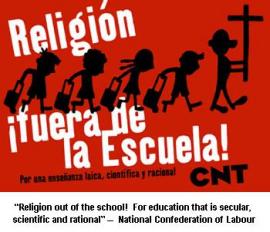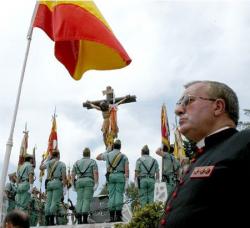 The four 1979 concordats
The four 1979 concordats
When Franco died in 1975 Spain became a constitutional monarchy. The next year a couple of article in Franco's concordat were revised and then in 1979 there followed more "revisions". These are actually four full-scale concordats concerning legal, educational, military and financial matters. These concordats have proven to be controversial, provoking several court challenges and a European Commission investigation.
All four were signed on 3 January 1979 and ratified 4 December that year. These concordats have been criticised as giving unfair privileges: “the Catholic Church enjoys tax benefits and exemptions that are not enjoyed by any other religious faith in Spain, which constitutes religious discrimination against the other religious faiths...” [1]
 Controversy over the Education Concordat
Controversy over the Education Concordat
The Agreement on education and cultural affairs has been contentious in Spain where the divisions of the civil war period linger on. There is strong opposition in some quarters to the Education Concordat whose Article 2 mandates Catholic religious education as a core subject in state schools.
Such classes were the topic of a 2009 Vatican directive, in an apparent attempt to tighten them up worldwide. The Vatican Congregation for Catholic Education criticised teaching children about religion in general, rather than teaching them Catholic doctrine in particular. [2] In opposition to this, a poster of the National Confederation of Labour, a labour union that was banned by Franco reads: Religion in the schools? No, thank you!
There has also been a legal challenge to the content of this agreement with the Vatican. In line with Article 6 the Spanish Church tried to ensure that catechism was “suitably imparted” by firing a religion teacher who had married a divorced man. Since the Church does not recognise divorce, it regarded her as a bigamist and not fit to teach religion classes. However, in 2011 the Spanish Supreme court decided in her favour. [3] It ruled that her marriage bore “no relation to the plaintiff's work as a teacher” and overturned the decisions of lower courts, which had backed the Church. This judgement frees Spanish teachers from religious control over their private lives, something that their colleagues in Germany can only dream of. [4]
However, although the court ruling eroded the Education Concordat, a parliamentary challenge by left-wing parties in 2012 failed to alter the other concordats. [5]
 Catholic military chaplains no longer minister to all
Catholic military chaplains no longer minister to all
The Agreement on the armed forces had to be revised when the Catholic Church ceased to be the state church. Something had to be done with the part of Franco's concordat (Final Protocol note on Article 32) about the jurisdiction of Cahtolic chaplains. This section had the military chaplains minister "to all Army, Navy and Air Force personnel on active service [...] to their wives and children who reside with them, to students at Military academies and schools". Yes, "all" of them, thus implying that one could not be a member of the Spanish armed forces unless one was Catholic.
Legal concordat contains a secrecy clause
In the Agreement on legal affairs Article I.6, stipulates that all Church records are to be kept “inviolable”, which would hide any documentary evidence of Church collusion with Franco. (A similar secrecy clause in the 1992 concordat with the Côte d'Ivoire provides for the movement of large amounts of money to the Vatican from an impoverished African nation.) And, indeed, in almost thirty years after the secrecy of Spanish Church records was inserted in this way into treaty law, Spain finally opened its first criminal investigation into Franco-era executions and repression. In 2008 a Spanish judge ordered state bureaucrats and the Roman Catholic church to hand over to investigators all relevant documentation. [6] However, a right-wing group successfully challenged the inquiry in the Supreme Court. This shocked many, including a leading international jurist who said the prosecution of judges for carrying out their professional work was "an inappropriate and unwarranted interference with the independence of the judicial process". [7] This attack on the judge protected the Church records proactively, so that the legal concordat did not even need to be invoked.
The Finance Concordat has property tax loopholes, with no end in sight for state aid to the Church
The Agreement on economic affairs does not forbid taxation on profit-making activities of the Church: in fact, its Article IV does not mention these at all. However, the national laws meant to implement the financial concordat are claimed to forbid this. [8] As a result, property-tax exemptions have, in actual fact, been granted to Catholic Church enterprises. Many Spanish municipalities extend tax-exemption even to commercial properties owned by the Church, rather than confining it to the categories listed in Article IV.1.A. [9]
In 2007 the European Commission asked the Spanish Government to disclose the “fiscal benefits” of the Church. The move refers to the tax loophole it enjoys with regard to its buildings. [10]
Also controversial is the continuing state aid to the Catholic Church despite promises in the financial concordat. Articles II.4 and II.5 of the Financial Concordat oblige Spanish taxpayers to supplement the church tax by giving the Church a “top-up” to help meet its expenses.
Yet although the Church here promises to pay its own way within three years, a quarter of a century after the deadline has passed, it is still demanding money every year from the Spanish Government. [11]
Notes
1. Parliamentary question E-2540/03 by Maurizio Turco (NI) to the [European] Commission, 21 July 2003. http://www.europarl.europa.eu/sides/getDoc.do?pubRef=-//EP//TEXT+WQ200w-2540+0+DOC+XML+V0//EN&language=MT
2. Congregation for Catholic Education, “Circular letter to the Presidents of Bishops' conferences on religious education in schools”, 5 May 2009. http://www.vatican.va/roman_curia/congregations/ccatheduc/documents/rc_con_ccatheduc_doc_20090505_circ-insegn-relig_en.html
3. Giles Tremlett, “Spain ends church control over religion teachers' married lives”, Guardian, 20 April 2011. http://www.guardian.co.uk/world/2011/apr/20/spain-catholic-church-religion-teacher
4. “How far can German churches discriminate against over a million employees?” Concordat Watch. http://www.concordatwatch.eu/topic-43061.843
5. “Spain: Motion for revision deal with Holy See rejected”, ANSA, 08 March 2012. http://ansamed.ansa.it/ansamed/en/news/sections/politics/2012/03/08/visualizza_new.html_129198356.html
(ANSAmed) - MADRID, MARCH 8 - The Foreign Affairs Commission of the Spanish Congress has rejected a motion of the left-wing parties on a revision of the agreements closed by the Spanish State and the Holy See in 1976 and 1979, the Spanish media report today. The motion of the PSOE council group and the Galician Nationalist Bloc (BNG), asked the government of Mariano Rajoy to revise the legal, cultural and economic aspects of the deals as well as the religious presence in the armed forces that is part of the agreements, in order to defend the state's secularity and stress the non-denominational character of the Spanish Constitution. The motion also proposes tax payments for the religious institutions present in Spain, on the same level as other institutions. The PSOE, BNA, the leftwing non-denominational coalition and the constitutional UpyD party voted for the motion, but it was rejected by the overwhelming majority of the PP, together with the Catalan Christian Democratic CiU party.
6. "Judge Orders Investigation of Executions in Franco Era", New York Times, 16 October 2008. http://www.nytimes.com/2008/10/17/world/europe/17spain.html
7. "Spanish judge faces Supreme Court", BBC News, 9 September 2009. http://news.bbc.co.uk/2/hi/europe/8245664.stm
8. “Financially troubled parts of Europe consider taxing church properties”, Washington Post, 14 September 2012 http://www.washingtonpost.com/business/economy/financially-troubled-cities-in-spain-consider-taxing-church-properties/2012/09/13/3b62c736-f842-11e1-8398-0327ab83ab91_story.html
9. Lisa Abend, “Amid Economic Crisis, Spain Ponders Taxing Catholic Church Property”, Time, 7 June 2012. http://world.time.com/2012/06/07/amid-economic-crisis-spain-ponders-taxing-catholic-church-property/
10. “EU investigates legality of Church’s tax concessions”, The Tablet, 6 October 2007. http://www.thetablet.co.uk/issue/1000069/worldnews
11. Julius Purcell, “Threat to State Aid Alarms Spanish Bishops”, Telegraph, 12 June 2005. http://www.telegraph.co.uk/news/worldnews/europe/spain/1491889/Threat-to-state-aid-alarms-Spanish-bishops.html







